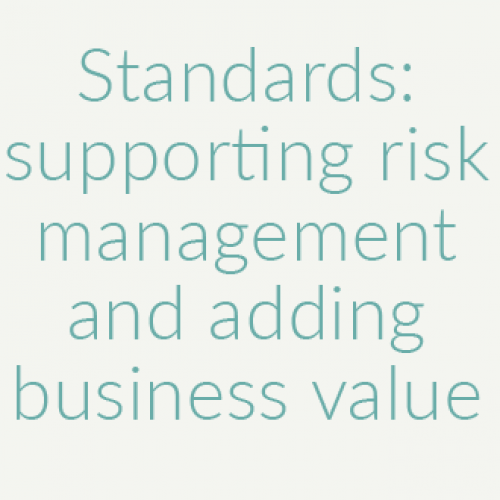Standards: supporting risk management and adding business value
Standards
Introduction
Julia Graham, deputy CEO and technical director, Airmic
When I started my risk management professional journey, I searched for tools and techniques to help me design a risk management system for my organisation. There was very little practical help available. Then I discovered the world of standards. Now having been involved in the development of risk management standards for almost 20 years, I remain convinced that when they are used wisely, there is and continues to be a place for standards in the management activities of organisations - including the activities associated with managing risk and insurance.
The international risk management standard ISO 31000: 2009 was replaced earlier this year by ISO 31000: 2018 Risk management – Guidelines. This encouraged Airmic to step back and reflect on how standards can help organisations to excel and how they can support risk managers - because there seems to be a fear that standards add bureaucracy and not value. We believe that, consistently applied, the consensus among stakeholders on good practice represented by standards is likely to streamline systems.
Standards are an important means of communicating to trading partners that our products and processes follow recognised good practices that they can trust in a competitive world, and that the quality of our risk management makes us a desirable partner.
How standards help the risk manager: achieving objectives
Howard Kerr, CEO, BSI Group
Business standards are essentially agreements to apply best practice and knowledge that has been developed by users and practitioners for their own use. They contain the distilled wisdom of people with expertise or an interest in the subject matter: manufacturers, service providers, distributors, trade associations, academics, regulators and consumers. They enable real world, peer to peer engagement and ensure consistency of output.
We know from research that we conducted with the Centre for Economics and Business Research (Cebr), that standards make a significant, positive contribution to the success of UK companies, for example increasing productivity, enhancing the quality of products and efficiency of processes, and promoting international trade. The full report can be found here:
https://www.bsigroup.com/LocalFiles/en-GB/standards/BSI-The-
Economic-Contribution-of-Standards-to-the-UK-Economy-UK-EN.pdf
The UK has led the evolution of consensus standards for more than a century. We have developed from technical product standards and process standards to consensus on principles of good business practice for leadership, governance and risk.
- Remove technical barriers to trade
- Improve supply chains and create fair and equal competition
- Provide business credentials
- Increase consumer protection
- Give regulatory support
- Stimulate innovation
- Manage organisation risk
- Fill out an application Our membership manager will assess your eligibility against our criteria.
- Complete your profileIf you are eligible for membership you will be asked to answer a few questions about yourself.
- PaymentYou can make payment online using a card or request an invoice.

